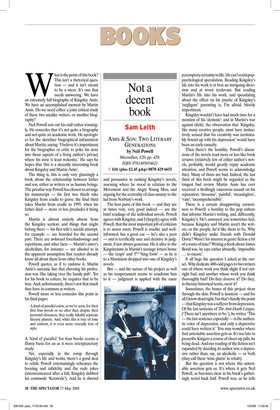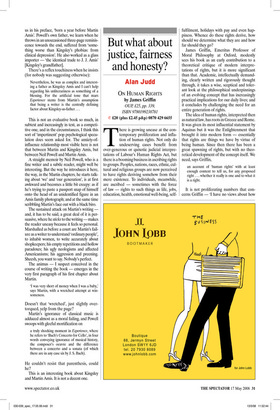Not a decent book
Sam Leith
AMIS & SoN: Two LITERARY GENERATIoNS by Neil Powell Macmillan, £20, pp. 429, ISBN 9781405054621 ✆ £16 (plus £2.45 p&p) 0870 429 6655 What is the point of this book? This isn’t a rhetorical question — and it isn’t meant to be a sneer. It’s one that needs answering. We have an extremely full biography of Kingsley Amis. We have an accomplished memoir by Martin Amis. Do we need either a joint critical study of these two unalike writers, or another biography?
Neil Powell sets out his stall rather winningly. He concedes that it’s not quite a biography and not quite an academic work. He apologises for the sketchier biographical information about Martin, saying: ‘I believe it’s impertinent for the biographer or critic to poke his nose into those aspects of a living author’s privacy where his nose is least welcome.’ He says he hopes that ‘this is a decently interesting book about Kingsley and Martin Amis’.
The thing is, this is only very glancingly a book about the relationship between father and son, either as writers or as human beings. The peculiar way Powell has chosen to arrange his manuscript — his first two thirds take Kingsley from cradle to grave; the final third takes Martin from cradle to 1995, when his father died — more or less precludes it being so.
Martin is almost entirely absent from the Kingsley section; and things that might belong there — his first wife’s suicide attempt, for example — are hoarded for the second part. There are awkward foreshadowings and repetitions, and other facts — Martin’s sister’s alcoholism, for instance — are alluded to in the apparent assumption that readers already know all about them from other books.
Powell quotes, as if to endorse it, Martin Amis’s sarcastic line that choosing his profession was ‘like taking over the family pub’. Yet for his book to cohere, he requires that to be true. And, unfortunately, there’s not that much they have in common as writers.
Powell more or less concedes this point in his final pages:
A kind of parallel exists, as we’ve seen, for their first four novels or so; after that, despite their personal closeness, they really inhabit separate literary planets. And, while this is true of tone and content, it is even more crucially true of style.
A ‘kind of parallel’ for four books seems a flimsy basis for an as it were interplanetary study.
Yet, especially in the romp through Kingsley’s life and works, there’s a good deal to relish. Powell entertainingly rehearses the boozing and infidelity and the rude jokes (inconvenienced after a fall, Kingsley dubbed his commode ‘Kermode’). And he is shrewd and persuasive in ranking Kingsley’s novels, assessing where he stood in relation to the Movement and the Angry Young Men, and arguing for the centrality of class anxiety to the lad from Norbury’s work.
The best parts of this book — and they are at times very, very good indeed — are the brief readings of the individual novels. Powell agrees with Kingsley, and I (largely) agree with Powell, that the most important job of criticism is to assess merit. Powell is erudite and wellinformed, has a great ear — he’s also a poet — and is terrifically sure and decisive in judgment, if not always generous. He is alive to the Kingsleyisms in Martin’s teenage letters home — the ‘craps’ and ‘f***king fools’ — as he is to a Martinism dropped into one of Kingsley’s novels.
But — and the nature of his project as well as his temperament seems to condemn him to it — judgment is applied with the same peremptory certainty to life. He can’t resist poppsychological speculation. Reading Kingsley’s life into his work is at best an intriguing diversion and at worst irrelevant. But reading Martin’s life into his work, and speculating about the effect on his psyche of Kingsley’s ‘negligent’ parenting is, I’m afraid, bloody impertinent.
Kingsley wouldn’t have had much time for a mention of his ‘demons’; and in Martin’s war against cliché, the observation that ‘Kingsley, like many creative people, must have instinctively sensed that his creativity was inextricably bound up with his depression’ would have been an early casualty.
Then there’s the hostility. Powell’s discussions of the novels read more or less like book reviews (relatively few of either author’s novels, probably, would greatly repay academic attention, and Powell seems to acknowledge this). Many of them are bad. Indeed, the last third of this book might be regarded as the longest bad review Martin Amis has ever received: a thrillingly rancorous assault on his reputation: ‘tiresome’, ‘painful’, ‘meaningless’, ‘vain’, ‘incomprehensible’.
There is a certain disapproving earnestness to Powell; a hostility to the pop culture that informs Martin’s writing, and, differently, Kingsley’s. He’s annoyed, you sometimes feel, because Kingsley and Martin aren’t the writers, or the people, he’d like them to be. Why didn’t Kingsley make friends with Donald Davie? Wasn’t his interest in genre fiction a bit of a waste of time? Writing a book about James Bond was, he says rather absurdly, ‘impossible . . . to excuse’.
It all begs the question I asked at the outset. Why dedicate 400-odd pages to two writers one of whose work you think slight if not outright bad, and another whose work you think thoroughly bad? Do they deserve it? Do they, in literary-historical terms, merit it?
Sometimes, the bones of this project show through the skin. Powell is insistent — and for all I know dead right, but that’s hardly the point — that Kingsley was a sufferer from depression. Of the last sentence of The Anti-Death League, (‘There isn’t anywhere to be.’), he writes: ‘This — the last sentence especially — is the authentic voice of depression, and only a depressive could have written it.’ You may wonder where that untestable assertion gets us. It’s too late to prescribe Kingers a course of cheer-up pills, he being dead. And our reading of the fiction isn’t expanded by deciding its author was a depressive rather than, say, an alcoholic — or both (they call them ‘wine glums’ in rehab).
But the question is not where this untestable assertion gets us. It’s where it gets Neil Powell, as becomes clear in his book’s gatheringly weird back half. Powell was, as he tells us in his preface, ‘born a year before Martin Amis’. Powell’s own father, we learn when he throws in an unoccasioned three-page reminiscence towards the end, suffered from ‘something worse than Kingsley’s phobias: from clinical depression’. He also worked as a glass importer — ‘the identical trade to J. J. Amis’ [Kingsley’s grandfather].
There’s a reflex touchiness when he insists (for nobody was suggesting otherwise):
Nevertheless, he was as complex and interesting a father as Kingsley Amis and I can’t help regarding his unliterariness as something of a blessing. For the artificial tone that mars Experience stems from Martin’s assumption that being a writer is the centrally defining factor about Kingsley-as-father . . .
This is not an evaluative book so much, in subtext and increasingly in text, as a competitive one, and in the circumstances, I think this sort of ‘impertinent’ pop psychological speculation does seem asked for. The anxiety-ofinfluence relationship most visible here is not that between Martin and Kingsley Amis, but between Neil Powell and Martin Amis.
A straight memoir by Neil Powell, who is a fine writer and a subtle reader, might well be interesting. But the way he introduces it here, the way, in the Martin chapters, he starts talking about ‘we’ and ‘our generation’, is at first awkward and becomes a little bit creepy: as if he’s trying to paste a passport snap of himself onto the head of an unidentified figure in an Amis family photograph; and at the same time scribbling Martin’s face out with a black biro.
The sustained attack on Martin’s writing — and, it has to be said, a great deal of it is persuasive, where he sticks to the writing — makes the reader uneasy because it feels so personal. Marshalled as before a court are Martin’s failure as a writer to understand ‘ordinary people’, to inhabit women, to write accurately about shopkeepers; his empty repetitions and hollow paradoxes; his ugly neologisms and affected Americanisms; his aggression and preening. Sheesh, you want to say. Nobody’s perfect.
The animus — I suspect conceived in the course of writing the book — emerges in the very first paragraph of his first chapter about Martin.
‘I was very short of money when I was a baby,’ says Martin, with a wretched attempt at winsomeness.
Doesn’t that ‘wretched’, just slightly overtorqued, yelp from the page?
Martin’s ignorance of classical music is adduced almost as a moral failing, and Powell swoops with gleeful mortification on a truly shocking moment in Experience, where he refers to ‘Bach’s Concerto for Cello’, in four words conveying ignorance of musical history, the composer’s oeuvre and the difference between a concerto and a sonata (of which there are in any case six by J. S. Bach).
He couldn’t resist that parenthesis, could he?
This is an interesting book about Kingsley and Martin Amis. It is not a decent one.











































































 Previous page
Previous page